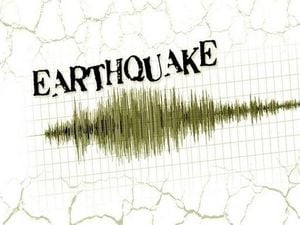New Jersey Representative Jeff Van Drew has found himself at the center of a political storm after making eyebrow-raising claims about the 2020 election on Fox Business. During the August 20, 2025, interview, Van Drew, a Republican who famously switched parties from Democrat before his re-election, alleged that he had spoken to “large numbers” of deceased people who voted by mail in the 2020 presidential race. The comments, which quickly went viral, reignited a long-running debate about the integrity of mail-in voting and the persistence of unfounded voter fraud claims.
Van Drew’s remarks came hot on the heels of former President Donald Trump’s renewed push against mail-in ballots. Trump had just announced his intention to "lead a movement" to eliminate mail-in ballots and voting machines ahead of the 2026 midterm elections, a move that has been met with both fierce support and ridicule across the political spectrum. According to The Daily Beast, Van Drew’s comments appeared to be a direct echo of Trump’s ongoing narrative about supposed widespread election fraud.
On Fox Business, Van Drew didn’t mince words: “There were multiple mail-in ballots sent to the same person. Sometimes people would have multiple ballots sent to different addresses. Other times, people who are passed away—these are real people I spoke to, large numbers of them, and it’s indicative of what happened around the country.” The claim that he had spoken to deceased voters, in particular, left many observers incredulous and sparked a wave of mockery online and in the press.
For years, Trump and his allies have promoted the idea that the 2020 election was stolen, alleging—without credible evidence—that “millions” of “illegal ballots” were cast for Joe Biden. These accusations have persisted despite repeated investigations, audits, and court cases, none of which have uncovered widespread fraud. In fact, as highlighted by The Daily Beast, election after election has shown that only a handful of fraudulent voting cases actually occur, and, ironically, many of those involve Republican voters themselves.
The idea of “dead people voting” is not a new trope in American politics. Decades ago, before the advent of electronic record-keeping, local governments relied on paper records often stored in separate departments, making it easier for errors—or, on rare occasions, exploitation—to occur. But those days are largely behind us. Modern systems, with their interconnected databases and cross-checks, have made such abuses exceedingly rare. According to The Daily Beast, “try as they might the GOP can’t identify more than a handful of cases of actual fraudulent voting. And of those, more than half are Republicans!”
Despite these facts, the narrative of mass mail-in voting fraud remains alive in certain political circles. Van Drew’s district, which once elected him as a Democrat, has since re-elected him as a Republican, reflecting the broader realignment that has taken place in parts of the country. His embrace of Trump’s claims, however, has drawn criticism from both sides of the aisle. Critics argue that such rhetoric undermines public confidence in elections and distracts from genuine policy issues affecting constituents.
Van Drew’s statements also come at a time when the Republican Party is grappling with internal divisions over how to approach voting access. While Trump and his closest allies have called for sweeping restrictions—including an outright ban on mail-in ballots—many Republican voters, even in conservative states, have grown accustomed to the convenience and security of voting by mail. As The Daily Beast notes, “mail-in voting has expanded even in GOP states. It makes it easier to vote and even red state voters know it’s secure and can be trusted.”
Trump, for his part, has floated the idea of signing an executive order to bar states from using mail ballots and certain voting machines, claiming—again without evidence—that voting machines are “highly inaccurate” and more costly than watermarked paper ballots. Yet, according to reporting, most Americans already cast their votes on paper ballots, and multiple studies have shown that hand-counting is actually less accurate and more expensive than machine tabulation.
Trump also asserted that the United States is the only country to allow mail-in voting, a claim that is demonstrably false. Many democracies around the world provide mail-in options for their citizens, particularly those living abroad or with mobility challenges. Moreover, ahead of the 2024 election, Trump himself encouraged his supporters to vote by mail, though the practice has since become more closely associated with Democratic voters. Since 2020, Democrats have used mail-in ballots at much higher rates than Republicans, a gap that has only widened as GOP-led states have enacted new restrictions.
Van Drew’s comments—especially his claim of conversing with deceased voters—have been widely lampooned. The Daily Beast offered a biting take: “I guess spending his time communing with the dead explains his avoidance to Town Halls or other events back home. He’s been BUSY. Doing something few people can do!” The article went on to suggest that Van Drew’s remarks might not hurt him politically in his district, given the strong support for Trump and the persistence of election conspiracy theories among some segments of the electorate.
Still, there are signs of fatigue and skepticism even within the Republican base. The Daily Beast observed, “the cult is wavering just a bit lately,” noting that recent scandals and policy disagreements have begun to erode the once-solid unity behind Trump’s claims. At the same time, the practical benefits of mail-in voting—especially for older and rural voters—have led some GOP officials and voters to quietly resist efforts to eliminate it altogether.
As the nation looks toward the 2026 midterms, the debate over voting access and election integrity shows no signs of abating. While the loudest voices continue to push unsubstantiated claims, the evidence remains clear: mail-in voting is secure, reliable, and trusted by millions of Americans across the political spectrum. The spectacle of politicians claiming to speak with the dead may provide fodder for late-night comedians, but for most voters, the real issues remain closer to home—and very much alive.
As the dust settles on Van Drew’s latest headline-grabbing remarks, the broader conversation about democracy, trust, and the future of American elections continues to evolve, with both sides watching closely to see how voters respond at the ballot box.




